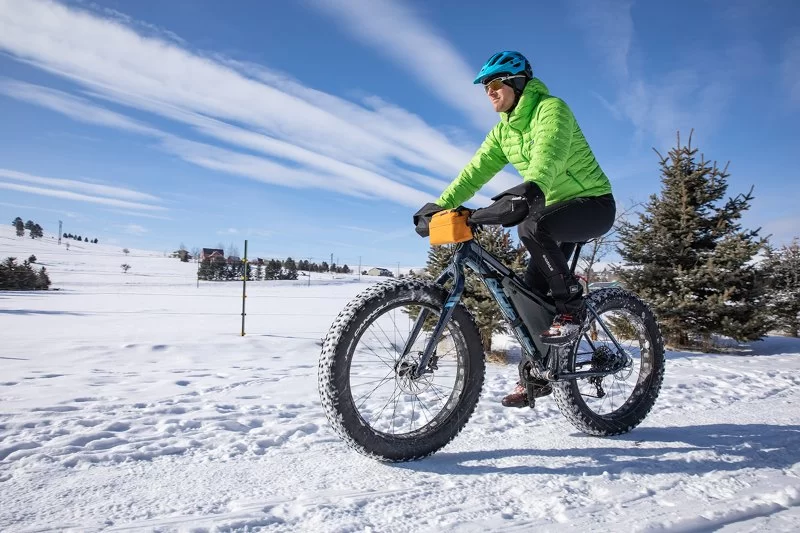Discover the essential gear for fat biking in the snow. Learn what equipment you need, practical tips, and real experiences to make your winter rides safe, fun, and unforgettable.

- Why-fat-biking-in-the-snow-requires-special-gear
- The-right-fat-bike-and-tires-for-snowy-terrain
- Layering-clothing-for-winter-rides
- Safety-gear-and-navigation-tools
- Real-stories-from-winter-fat-bikers
- Planning-your-ride-and-preparing-mentally
- Choosing-quality-gear-for-long-term-performance
Why Fat Biking in the Snow Requires Special Gear
Fat biking in the snow is more than just a sport—it’s an adventure that combines endurance, skill, and resilience against nature’s most challenging elements. Unlike summer rides, where regular biking gear might suffice, snow biking requires equipment designed to handle icy terrain, freezing temperatures, and unpredictable weather. Riders often discover that without the right setup, even short rides can become exhausting or unsafe. This is why investing in proper winter biking gear transforms the experience from a battle with the elements into a thrilling ride through a winter wonderland.
The Right Fat Bike and Tires for Snowy Terrain
The foundation of successful fat biking in the snow lies in your bike and tire selection. Fat bikes are built with oversized tires, typically 3.8 inches or wider, allowing them to glide over snow rather than sink. Tire pressure is another crucial factor—experienced riders often lower their PSI to as little as 5–8 for better traction. Many bikers also recommend studded tires when navigating icy patches. A rider from Minnesota once shared how switching to studded tires prevented countless falls during commutes on frozen trails. These adjustments highlight how even minor gear choices make a significant impact on safety and performance.
Layering Clothing for Winter Rides
Staying warm without overheating is an art form when it comes to fat biking in the snow. The best approach is layering: a moisture-wicking base layer, an insulating mid-layer, and a windproof outer shell. Hands and feet require extra care—thermal gloves, insulated boots, and sometimes even chemical warmers make long rides possible. A rider from Colorado recalled how forgetting proper socks cut his adventure short due to numb toes. Small mistakes in clothing can turn a scenic ride into a test of endurance, making proper layering just as important as your bike itself.
Safety Gear and Navigation Tools
Snow biking introduces unique risks such as reduced visibility, hidden obstacles, and disorientation in snowy landscapes. Helmets with built-in insulation, ski goggles, and reflective gear enhance both safety and comfort. Navigation tools, including GPS devices or even old-fashioned compasses, help prevent riders from getting lost when trails are covered. In Alaska, a group of bikers shared how a sudden whiteout left them dependent on their GPS devices to find their way back to camp. These experiences underscore the importance of packing tools that go beyond the typical biking checklist.
Real Stories from Winter Fat Bikers
Stories from winter fat bikers often reflect both the challenges and joys of the sport. One rider recounted a 20-mile ride under the Northern Lights in Norway, describing it as a surreal mix of exhaustion and awe. Another shared how riding with a group through snow-packed forest trails created a sense of camaraderie that made the cold almost irrelevant. These personal accounts highlight that fat biking in the snow is not just about endurance—it’s about creating unforgettable memories that only winter landscapes can offer.
Planning Your Ride and Preparing Mentally
Beyond physical preparation, mental readiness is critical. Fat biking in the snow demands patience and adaptability. Weather conditions can change rapidly, and trails can range from powdery snow to slippery ice in the same ride. Successful riders plan routes carefully, set realistic distances, and always share their plans with someone before heading out. A rider in Vermont emphasized how knowing when to turn back is just as important as pushing forward—mental discipline can be the difference between an epic adventure and a dangerous situation.
Choosing Quality Gear for Long-Term Performance
Investing in durable, high-quality gear ensures that winter biking remains enjoyable for years to come. From reinforced bike frames to weatherproof clothing, choosing the right products pays off over time. Riders often find that cheaper gear fails in extreme conditions, turning rides into frustrating experiences. For those unsure of where to begin, trusted providers such as Pine Cliff Resort often recommend reliable brands tailored to different riding styles. By prioritizing quality, riders not only enhance their performance but also protect themselves against the harsh realities of winter terrain.
Urban Saddle Ranch
7745 Cottage Cir, Huntingdon, PA 16652, USA
Visit Location PageAlamosa / Great Sand Dunes KOA Journey
6900 Juniper Ln, Alamosa, CO 81101, USA
Visit Location Page